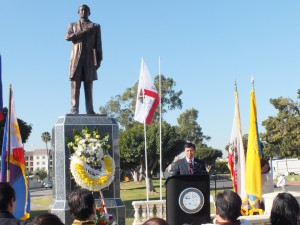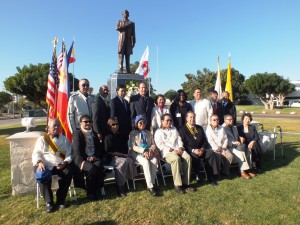
Former Carson Mayor Jim Dear, now City Clerk, was a major advocate for the Jose Rizal Statue in the Carson International Sculpture Garden in 2012. PHOTOS BY FLORANTE IBANEZ
CITY OF CARSON, California – This city in Southern California honored the memory of Dr. José Protasio Mercado Rizal y Alonso Realonda, Philippine national hero and martyr of the revolution against Spain, during a recent ceremony.
Over a hundred community leaders and city officials and staff members gathered before the tall statue of Rizal that stands prominently in the City of Carson International Sculpture Garden adjacent to the Carson Community Center.
After youthful singers sang the Philippine and American national anthems, city officials, Consulate General Leo Herrera-Lim and other speakers recalled the highlights of Rizal’s short but influential life as a poet, author, artist, scholar and physician.
They traced his last hours before his execution by firing squad on December 30, 1896. It is widely acknowledged that his writings sparked the Philippine revolution and helped launch the Katipunan led by Andres Bonifacio. They also mentioned his brief transcontinental journey across the United States in 1888 to educate himself on American democracy and his experience of observing racism towards black Americans.

Many local leaders, City staff and commissioners as well as the Philippine Consulate attended to remember Jose Rizal.
During his first stay in Europe, Rizal wrote his novel, Noli Me Tangere. The book was written in Spanish and first published in Berlin, Germany in 1887. The Noli, as it is more commonly known, tells the story of a young Filipino man who travels to Europe to study and returns home with new eyes to the injustices and corruption in his native land. His novel produced a great uproar in the Catholic Church in the country, leading to his being excommunicated.
Despite the reaction to his first novel, Rizal wrote a second novel, El Filibusterismo, and published it in 1891. Where the protagonist of Noli, Ibarra, was a pacifist and advocate of peaceful means of reform, the lead character in Fili, Simeon, was more militant and preferred to incite an armed uprising to achieve the same end.
What made Jose Rizal worthy of becoming the Philippines’ national hero was not merely his intelligence, personality, literary acumen, or his pacifist ideals. Rather, it was also his patriotism, optimism, undying love for his country and his belief in his countrymen which set him apart. He believed not merely in freedom, but also in the potential of the Filipino people to achieve their full potential, which was being suppressed by colonial rule.
Like us on Facebook

